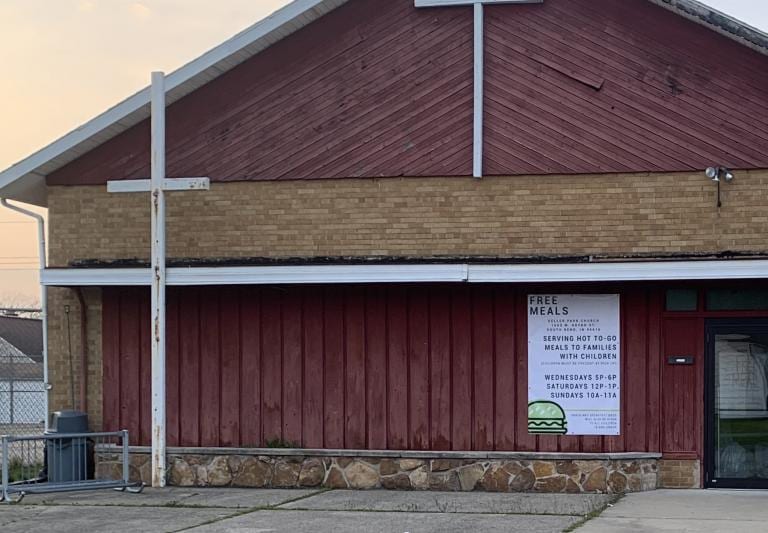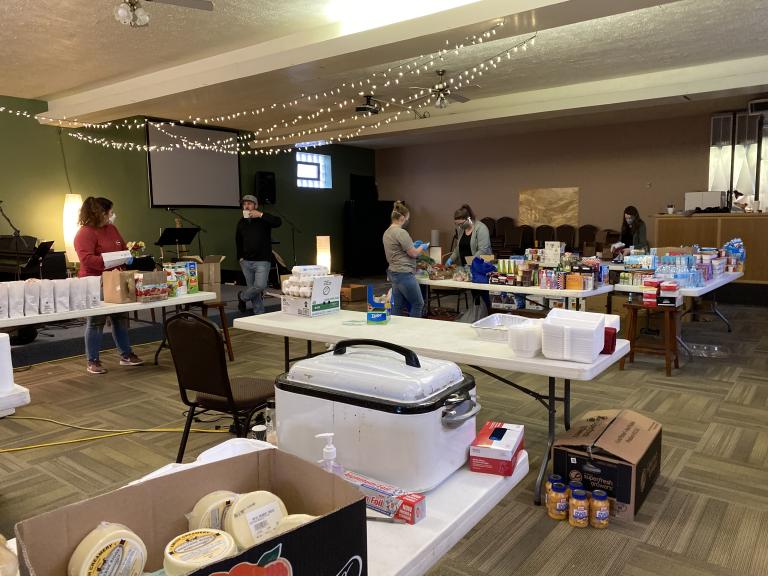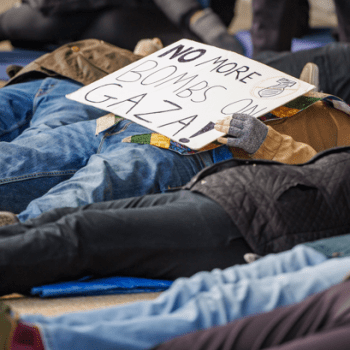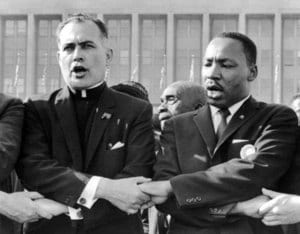Love in the time of Corona—embracing our community center roots to meet the needs of neighbors in the midst of crisis
By Carrie Badertscher and David C. Cramer

Easter morning is the highlight of the year at Keller Park Church in South Bend, Indiana, where the two of us are copastors. We begin with a brunch, then have an Easter egg hunt for the kids, and then end with a celebratory service in which we proclaim Jesus’s victory over death:
“He is risen!”
“He is risen, indeed!”
This year our Easter celebration looked different, but it was no less profound.
On March 13, with news of the spread of the novel Coronavirus to the United States, we made what seemed like a difficult decision: to cancel Sunday morning services for the remainder of March. We assumed that these were temporary measures and that we would gather again for our beloved Easter service, if not by Palm Sunday.
Then we received word that the South Bend Community Schools would be closing in light of the governor’s orders to shelter-in-place. We knew that this meant that many of the kids in our neighborhood would go without adequate nutrition, since many of them rely on school meals throughout the week. Even with the school corporation providing sack lunches at various pick-up locations throughout the city, many kids would go without a regular hot meal.
And so, on March 16, our congregation sprang into action. Overnight we transformed our sanctuary into a food distribution center. We stacked chairs and put tables in their place. Boxes of cereal and bottles of Propel filled the front of the stage where music equipment once stood. Large roasters and to-go containers covered the ministry table. Bright colored masks made by volunteers found their place in the sound booth. We assembled a small but dedicated team of food preparers and distributors from those of us who live in walking distance to the church. The rest of the congregation contributed by making donations to our new “COVID-19 response” fund on our website or by dropping off extra groceries in a cooler on the front steps of the parsonage.

All of this was new, and yet it felt familiar. If you had come to the corner of Sherman and Bryan in the Keller Park neighborhood back in the 1950s, you would have found Barkley’s grocery store, where you could get your bread, milk, eggs, and even candy on your way home from work at the Studebaker automobile plant. After Studebaker closed in 1963, the grocery store became unsustainable, and in 1968 the building was bought by nearby Redeemer Missionary Church, who turned it into the Christian Community Center—a place where neighborhood youth could get off the street, get a snack, and play slot cars or have a supervised boxing match. Some of our elderly congregants tell stories of neighborhood children swinging from the beams in the basement, the same beams that remain there today.
Eventually those who oversaw the center began meeting on Sunday mornings, and the building was renamed Agape Missionary Church, after the New Testament word for self-sacrificial love. Congregants viewed the church as a place where people love one another and their neighbors, caring for not only spiritual needs but also physical ones. Perhaps because they got tired of explaining the meaning or pronunciation of the name—or perhaps because they wanted to more fully identify the church with the neighborhood—they eventually changed the name to Keller Park Church. Yet the mission of the church remained constant: to seek the peace of our neighborhood by sharing God’s love with our neighbors.
Last January, the only remaining grocery store within walking distance of the church closed its doors, creating a three-mile-wide food desert with Keller Park at the epicenter. In response, the church increased the output of our food pantry ministry in partnership with the Northern Indiana Food Bank. For years we had been giving out food boxes to neighbors who stopped by on Tuesday afternoons during office hours. But in January, a group of young mothers in the church who had previously been meeting together for “Mornings with Mamas” decided to begin meeting during food pantry hours to provide a hot meal for neighbors in need. Rebranded as “Afternoons with Amigas,” this group transitioned from focusing on fellowship to focusing on service.
So by the time we announced our food distribution ministry to the congregation in mid-March, they were already mobilized and well-prepared to spring into action. While we miss gathering in person and have made do with prayer meetings on Zoom and services on Facebook Live, our congregation has rallied behind our service to neighbors. In the first six weeks of our food distribution ministry, we served hot meals from the church eighteen times, totaling over 1,200 individual meals served. Each family who comes for food receives a hot meal to-go and additional food items, such as meat, bread, eggs, milk, and cereal. In addition, each child under 18 receives a sack of food items, such as carrots, string cheese, crackers, and granola bars. We have also continued our Tuesday afternoon food pantry, which has given away over 120 food boxes since the beginning of the pandemic. And we have added mobile, front-porch meal drop-offs for families who cannot leave their homes to come to the church for food for various reasons, including those in the neighborhood who are quarantined because of the virus.
While the stated purpose of the food distribution ministry is to provide a constant, stable food source to meet the physical needs of our neighbors, it has grown to be so much more. We have heard the giggles of a child whose mama came to the church to pick up Easter pancakes and also received a bag of empty plastic eggs and a bag of candy for an at-home Easter egg hunt. We have heard the lament of neighbors as they call or come to the church to share that a family member has contracted the virus, and they would now need meals dropped off on their porch. We have celebrated with neighbors who can finally reunite with their family after their fever has broken. We received a letter from a family who had been laid off from their jobs and were regularly coming to receive food. The letter, decorated with a springtime landscape by the family’s six-year-old daughter, read in part, “Not only is the food delicious; it is also filled with so much hope and love.”
On Easter morning, an elderly woman arrived at the church at the end of our serving time. She said that she was homeless and had been living out of her car. She had made a wrong turn and ended up in front of the church where she saw the sign for a free meal. More than free food, she asked if she could receive prayer. Across the threshold of the front doors of the church, we prayed for her and then passed her a warm breakfast and a box overflowing with food.
We then went to the stage, started the livestream on a smartphone, and—surrounded by boxes of food—declared into the camera: “He is risen!”
To which our congregants replied from their homes, “He is risen, indeed!”












